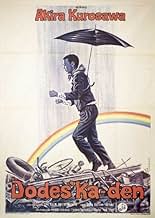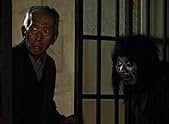Verschiedene Geschichten über die Leben der Slumbewohner Tokios, darunter ein geistig verwirrter junger Mann, der davon besessen ist, seine eigene Straßenbahn zu fahren.Verschiedene Geschichten über die Leben der Slumbewohner Tokios, darunter ein geistig verwirrter junger Mann, der davon besessen ist, seine eigene Straßenbahn zu fahren.Verschiedene Geschichten über die Leben der Slumbewohner Tokios, darunter ein geistig verwirrter junger Mann, der davon besessen ist, seine eigene Straßenbahn zu fahren.
- Für 1 Oscar nominiert
- 4 Gewinne & 1 Nominierung insgesamt
Empfohlene Bewertungen
The material in Dodes'ka-den is absorbing, but not in ways that one usually finds from the director, and mostly because it is driven by character instead of plot. There's things that happen to these people, and Kurosawa's challenge here is to interweave them into a cohesive whole. The character who starts off in the picture, oddly enough (though thankfully as there's not much room for him to grow), is Rokkuchan, a brain damaged man-child who goes around all day making train sounds (the 'clickety-clack' of the title), only sometimes stopping to pray for his mother. But then we branch off: there's the father and son, the latter who scrounges restaurants for food and the former who goes on and on with site-specific descriptions of his dream house; an older man has the look of death to him, and we learn later on he's lost a lot more than he'll tell most people, including a woman who has a past with him; a shy, quiet woman who works in servitude to her adoptive father (or uncle, I'm not sure), who rapes her; and a meek guy in a suit who has a constant facial tick and a big mean wife- to those who are social around.
There are also little markers of people around these characters, like two drunks who keep stumbling around every night, like clockwork, putting big demands on their spouses, sometimes (unintentionally) swapping them! And there's the kind sake salesman on the bike who has a sweet but strange connection with the shy quiet woman. And of course there's a group of gossiping ladies who squat around a watering hole in the middle of the slum, not having anything too nice to say about anyone unless it's about something erotic with a guy. First to note with all of this is how Kurosawa sets the picture; it's a little post-apocalyptic, looking not of any particular time or place (that is until in a couple of shots we see modern cars and streets). It's a marginalized society, but the concerns of these people are, however in tragic scope, meant to be deconstructed through dramatic force. Like Bergman, Kurosawa is out to dissect the shattered emotions of people, with one scene in particular when the deathly-looking man who has hollow, sorrowful eyes, sits ripping cloth in silence as a woman goes along with it.
Sometimes there's charm, and even some laughs, to be had with these people. I even enjoyed, maybe ironically, the little moments with Rokkuchan (specifically with Kurosawa's cameo as a painter in the street), or the awkward silences with the man with the facial tics. But while Kurosawa allows his actors some room to improvise, his camera movements still remain as they've always been- patient but alert, with wide compositions and claustrophobic shots, painterly visions and faces sometimes with the stylization of a silent drama meant as a weeper. Amid these sometimes bizarre and touching stories, with some of them (i.e. the father and son in the car) especially sad, Kurosawa lights his film and designs the color scheme as his first one in Eastmancolor like it's one of his paintings. Lush, sprawling, spilling at times over the seams but always with some control, this place is not necessarily "lighter"; it's like the abstract has come full-throttle into the scene, where things look vibrant but are much darker underneath. It's a brilliant, tricky double-edged sword that allows for the dream-like intonations with such heavy duty drama.
With a sweet 'movie' score Toru Takemitsu (also responsible for Ran), and some excellent performances from the actors, and a few indelible scenes in a whole fantastic career, Dodes'ka-den is in its own way a minor work from the director, but nonetheless near perfect on its own terms, which as with many Kurosawa dramas like Ikiru and Red Beard holds hard truths on the human condition without too much sentimentality.
It's too easy to give Kurosawa his laurels on the strength of the Toshiro Mifune films, his great panoramas of mist and rain, and Fuji, always, shrouded, revealed. Dodesukaden (Dodeska-Den in the US release from Janus) brings you right up into the characters, right into their faces, their homes, their hovels, their dreams. It's billed as Kurosawa's first color film. The composition is phenomenal, really. Each shot, no matter how it moves or how it doesn't, is as wonderfully framed as a painting, as balanced as a beautiful face. The color saturation is complete, and yet they seem to float above the screen rather than clobber you or intrude.
I am astounded by this film. I've never thought of Kurosawa as someone who would know how to handle squalor and the rude life of the bottom of the underclass. I was wrong. There isn't a false step in this picture, from the use of color to the editing to the choice of music and the times it's used. It's as moving a portrait of a community as I'll ever see. Dodesukaden belongs at the top of the canon of Kurosawaa's work, with Ran and The Hidden Fortress next to it.
The title comes from the sound a mentally retarded boy makes as he imagines he is operating a train. We slowly get to know more of the people in the small community, the two drunks who trade wives because they are not happy with the ones they have. The old man who is the center of the town who helps out a burglar that tries to rob him. The very poor father and son that cannot ever afford a house, so they imagine one up of their own. By the end of the film, the stories all come full circle, some turn out happy, others sad.
Since this was Kurosawa's first color film you can see that he uses it to his advantage and it shows. Maybe too much. This movie goes in many different directions and it's hard to settle down and get into it. But don't get me wrong, Dodes' Ka-Den may not be Kurosawa's best, but coming from the greatest director of all time, it's much better than 99% of today's films.
Wusstest du schon
- WissenswertesThe movie was made as the first feature of the Committee of the Four Knights, a group founded by four of Japan's greatest directors: Akira Kurosawa, Keisuke Kinoshita, Masaki Kobayashi and Kon Ichikawa. According to a interview with Ichikawa, they wanted their first picture to be a hit. When this film told a story deemed too depressing and was subsequently a failure with audiences, the group disbanded and never made another film. The movie's failure also contributed to Kurosawa's suicide attempt one year later.
- Zitate
Beggar: Our house ought to be built on a hill. We Japanese used to build houses in valleys and mountain coves. We've always preferred the lowlands.
Beggar's Son: That's true. I saw pictures of foreign countries. They have their houses in high places, but ours are in low places.
Beggar: There's a reason for that. There are many earthquakes and typhoons in Japan. Wooden houses in high places are easily shaken by earthquakes and typhoons. So they chose the lowlands to avoid the danger. But that's not the only reason.
Beggar: [continues] The Japanese prefer soft light to bright sunshine. We like shady places. We like to live in the midst of nature. So we couldn't get used to concrete houses.
Beggar's Son: That's right. I don't like concrete houses either. They're too cold for me.
Beggar: But we shouldn't forget one thing. It's true that wooden houses suit the Japanese people. But we mustn't cling to our culture and characteristics if we become weak and lose endurance as a result. By living in houses made of stone, iron, and concrete, foreigners have strengthened their characters and capabilities. Now we're building our own house. We must take our future into consideration. We must think of you, your children, and your grandchildren.
Beggar's Son: Yes, that's true.
- VerbindungenFeatured in 62nd Annual Academy Awards (1990)
Top-Auswahl
- How long is Dodes'ka-den?Powered by Alexa
Details
Box Office
- Weltweiter Bruttoertrag
- 981 $
- Laufzeit2 Stunden 20 Minuten
- Farbe
- Seitenverhältnis
- 1.37 : 1




























